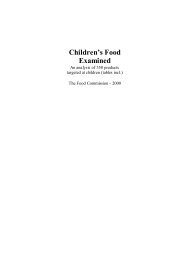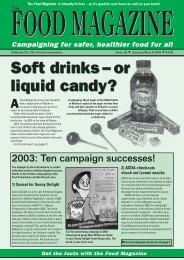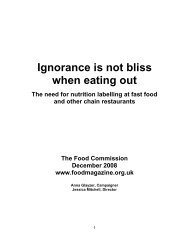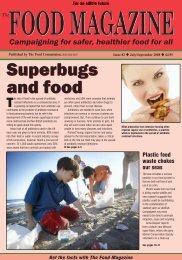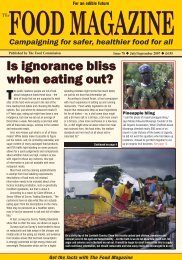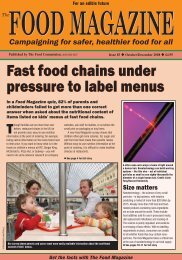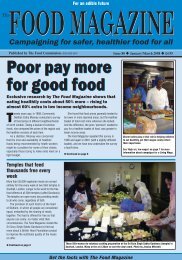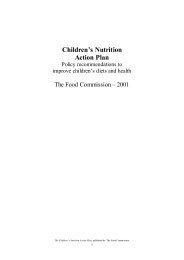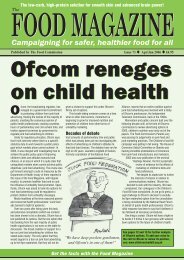to view original article from The Food Magazine
to view original article from The Food Magazine
to view original article from The Food Magazine
Create successful ePaper yourself
Turn your PDF publications into a flip-book with our unique Google optimized e-Paper software.
CHECKOUT<br />
Special report on the food companies that benefit by<br />
associating themselves with charitable or medical causes...<br />
Cause or<br />
compromise?<br />
Health claims on food products<br />
may make you feel sceptical. But<br />
add the trusted logo of a health<br />
charity or medical association and<br />
you may be more likely <strong>to</strong> buy the<br />
product. <strong>The</strong> <strong>Food</strong> Commission’s<br />
latest research shows that your<br />
trust might be misplaced.<br />
Browse the shelves of any<br />
supermarket and you’ll find healthy<br />
sounding claims attached <strong>to</strong> almost<br />
every type of food. Health-related<br />
descriptions appear on a diverse selection of<br />
products, <strong>from</strong> tinned spaghetti, margarine,<br />
cereals, jelly sweets, tinned fish and fruit, <strong>to</strong><br />
squash, bread, tea bags, processed cheese<br />
and chocolate.<br />
Some descriptions boast of the presence<br />
of a particular nutrient, such as calcium;<br />
some products proclaim added vitamins;<br />
others claim benefits for particular organs of<br />
the human body, or a reduced risk of disease<br />
by eating the food regularly. Some of these<br />
claims are backed up by scientific evidence.<br />
Others are not, and contribute <strong>to</strong> much<br />
confusion over food and health.<br />
In order <strong>to</strong> stand out amid this clamour of<br />
claims, endorsements (or apparent<br />
endorsements) are often used by food<br />
marketers <strong>to</strong> add weight and authority <strong>to</strong><br />
their claim, and <strong>to</strong> make one brand seem<br />
superior <strong>to</strong> others. Currently, heart-health<br />
claims on Nestlé Cheerios cereal are<br />
reinforced by BBC TV science reporter<br />
Judith Hann; the bone-health benefits of<br />
Osteocare calcium supplements are<br />
promoted in association with the English<br />
National Ballet; and Olympic rower Steve<br />
Redgrave tells of his remarkable recovery<br />
<strong>from</strong> high cholesterol levels in order <strong>to</strong> help<br />
sell Flora Pro.Activ margarine.<br />
Over the past year, the <strong>Food</strong> Commission<br />
has been moni<strong>to</strong>ring new endorsement-style<br />
marketing techniques popular with<br />
food manufacturers. <strong>The</strong>se are in<br />
the form of marketing partnerships<br />
between food companies and<br />
health charities or medical<br />
associations.<br />
A charity such as the<br />
British Heart Foundation, or a<br />
medical association such as<br />
the National Osteoporosis<br />
Society, enters in<strong>to</strong><br />
partnership with food<br />
companies and allows the<br />
organisation’s logo <strong>to</strong> appear<br />
on food products. Sometimes<br />
these marketing partnerships<br />
take the form of simple<br />
donation schemes. Here, the<br />
food company donates money<br />
<strong>to</strong> a health charity or cause in<br />
return for using the<br />
organisation’s logo on food<br />
packaging <strong>to</strong> announce its<br />
public good will. In other<br />
schemes, the link-up between<br />
the two organisations is used<br />
<strong>to</strong> make, imply or reinforce a claim for the<br />
health benefits of consuming the food.<br />
<strong>The</strong> common and critical fac<strong>to</strong>r is that any<br />
marketing claims for the health benefits of<br />
the food product are strengthened by the<br />
trust that people have in these health<br />
charities for offering impartial advice on<br />
health matters.<br />
Yet, as not-for-profit organisations enter<br />
in<strong>to</strong> commercial relationships with food<br />
companies, questions start <strong>to</strong> arise. Are the<br />
claims supported by these marketing<br />
partnerships scientifically<br />
substantiated? Are they<br />
trustworthy? Who is making<br />
the health statements –<br />
the company or the<br />
health charity or<br />
medical association? If<br />
a logo appears on the<br />
food packaging, what<br />
exactly does it<br />
represent? Did a fee<br />
change hands, and if so,<br />
did this compromise the<br />
accuracy of the claims?<br />
Does the food carrying<br />
the logo offer the best<br />
health benefits<br />
available? And, crucially,<br />
will following the advice<br />
help people stay<br />
healthy?<br />
<strong>The</strong> British Dietetic Association helps <strong>to</strong> promote pressed fruit juices in<br />
Safeway and Marks & Spencer that cost between 1.5 and 5.4 times as<br />
much as other pure fruit juices. Whilst the BDA does good work, the<br />
unintended implication here is that we should spend more <strong>to</strong> stay healthy.<br />
<strong>Food</strong> <strong>Magazine</strong> 57 11<br />
Apr/Jun 2002



